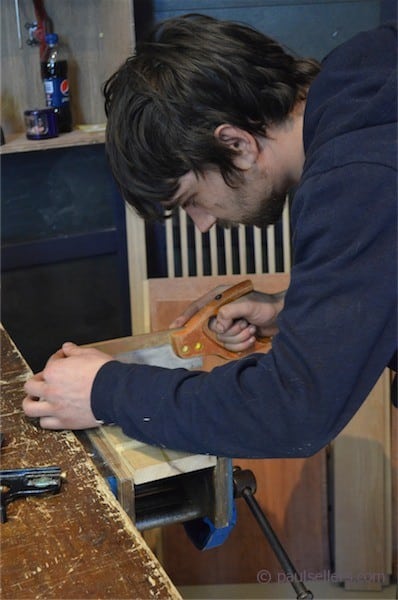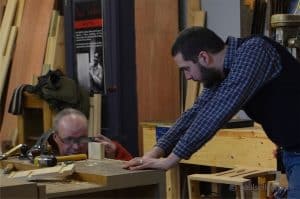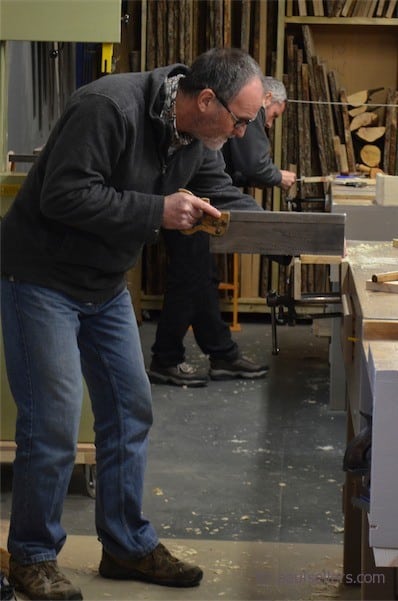Vocationally called to work wood



So, I find myself constantly in search of people trying to answer that vocational call and surprisingly I find them everywhere I look and everywhere I go. Oh they may be software engineers or bank advisors, office cleaners or teachers who teach classes and even woodworking, but they may not have discovered what they feel is intrinsic to their wellbeing and so they actually don’t feel that well about themselves. Then they cut a dovetail joint and plane a piece of wood and guess what? They begin to feel well. I find that when people find their vocational calling they aslo find they are vocationally charged.
Culture shifts change the way people perceive themselves and their future. This can be good or bad.
Dismantling perspectives can be hard sometime, but not usually impossible. Culture defines how people think, act and do what they do. It defines many of our choices to the point that woodworkers see their choice of woodworking as a hobby and not a vocation. It defines whether we use machines or our hands or both and it defines what we make and how we make it. I ask you to look at the faces of these students from last weekend’s class. What’s different is this. They arrived ahead of time, listened to every single word I said intensely and I mean intensely. They expedited what I said pretty much to the letter and when break times came, or lunch, I had to tell them to stop. I gave them 45 minutes max and they arrived back to class 15 minutes before and sat at my bench expecting me to share something with them. They had pen and paper and camera and cell phones at the ready, ready to record so as not to forget. Only when an exercise was totally completed did they stop and only then did they relax from the task of being creative. After a few minutes rest they picked up tools and without a word from me started cutting the same joint again. They took initiative throughout the day and more and more it came from within them. 

These three emails say something of what I am feeling:
Paul,
I would like to second Mick’s comments and say a massive thank you for the experience of a lifetime this weekend. It is very heart warming to know that there are still people like your good self in the world today. I feel I can start my woodworking journey in earnest now. Please extend my thanks to Phil for all his help. I hope we can meet again someday it was a pleasure listening to you talk not only about woodworking but life as well.
Many thanks again
Pat.
Hi Paul,
Thank you so much for your teaching at the weekend’s course. I had loads of fun and have come back home feeling inspired and confident to give things a go. I’m now looking at my various bookselves with thoughts along the lines of “I could probably do better!”
Thanks again and I’ll hopefully see you in the future.
Nick
Paul,
I just wanted to say a big thank you for the wonderful weekend course at Penhryn castle. The time went so quickly and it was informative, relaxing and thoroughly enjoyable. I loved your approach to the course and your views on life in general. Much of what you said can be easily transferred to my own teaching of aikido and I am certain that the next class I teach will be better because of this experience. Clearly I have learnt much about woodwork, but also much about life, philosophy and attitude.
I admire what you are doing and love your passion, thank you for the inspiration and I hope you keep it up for many years to come so others benefit too. If I can ever be of help pleases just call and I will be happy to help if I am able.
Yours,
Mick
PS I missed saying thank you to Phil in person. would you be kind enough to pass my gratitude to him for all his help over the weekend.


Paul,
I would love to actually make a living woodworking, but all the professional fine woodworkers I’ve spoken with (cabinet makers being an exception) have told me they had to supplement their income after 911 by working in a retail shop or teaching woodworking. Is it really possible for a middle-aged amateur to make a vocation of woodworking?
It takes about three years to establish any business I think. I also think that you must establish a reputation as a maker, decide on location and be prepared to negotiate problems, stay true to your intent to become a furniture maker or a boat bulder or a joiner and do it. I think that it’s true to say that in today’s world it is a difficult path to become a master craftsman, but it is also rewarding to develop a creative world to work from, design and build in, meet and greet in and so on. I have seen more and more people learn to sharpen their planes and make shavings and because they did, started teaching others. The shavings mesmerise people watching and they start teaching others to make shavings and become teachers of woodworking. Some people like making shavings and some like the hard work of becoming a craftsman or woman. Some people like to collect planes and some like to work for a living using them. One’s a luxury, the other a hobby. Woodworking was always my work. I decided on it and did it. I still love my work working at woodworking. I also see that people can enjoy making shavings and collecting planes. We talk and share stories and interact without conflict because it’s different strokes for different folks.
In answer to whether you can make a living without becoming a teacher to supplement your work as a crafting artisan. Yes you can. The early days are the difficult ones and 911 did affect working artisans severely, most severely. In economic downturns as we have experienced internationally, people stop buying furniture and live with what they have. I still think people can ease into becoming and keep their day job as they transition. You must be able to design and build economically. Creating work with a balanced combination of hand tools and machines is a good path to take. I have done that all of my life. Answering a vocational calling helps you stand against the naysayers if it is truly a vocational calling and also stand firm in difficult times. When you are married and have a family, it can be a difficult call. Being a provider, even if there are two in one household, is something we all have to do. Children and family are our responsibility, but lifestyle woodworking means a few nip and tucks to make the finances work. Being with your family is wonderful. I worked pretty much from home for much of my life as a father and a husband. I indeed have been a fortunate man, but no one can tell me it was easy at all.
I hope that you gain your dream. I think you will find opposition as people say when are you going to get a real job? I think too that it is a question of educating your local clientele through helping them to understand that you are building for a lifetime and a lifestyle. That what you build provides both and that it has a longevity dating back for centuries. It’s not flakey to want to work in your own shop with your own hands making designs you agonised over. It just takes guts!
Aye indeed. I’m an IT pro with a background in music, and always have a craving to be creative. I describe it as a demon I must feed. 😉 Woodworking fills that nicely. Unfortunately I am accustomed to the way of life my job affords. I have managed to build and sell specialized cabinets for the music industry, however work is fleeting and my day job slows my pace. My wife got me your series for Christmas so perhaps when I retire I’ll setup an etsy store and sell spatulas and such. I have to say, of all the things I’ve made, I haven’t been more proud as I am of my hand carved spoon. Looking forward to my first stool.
Best regards.
This all makes me grateful (again) that I emigrated to Germany but that I have access to this sort of blog.
What you say about working with wood as a vocation is quite true: I love
working with wood and handling it, and it is hard to keep hold of the
idea of being a vocational carpenter when everyone around me thinks I’m
crazy for not using machines for everything (“Why make dovetails by
hand? that’s what we have machines for.” et c) Thanks for helping me
keep perspective and swim against the flow.
I picked up an apprenticeship as a carpenter with a local company. The apprenticeship is a mix of college work and work in the local company so I get lots of training and real world experience. This is not an unusual situation in Germany, where to be recognised as a carpenter you have to work with a state recognised Master Carpenter and attend college. At the end of the course I’ll have theory exams and I’ll have to design and build my own piece of furniture to a set of guidelines. Assuming this doesn’t fall to bits when the judge pokes it, I’ll be an accredited carpenter (cabinet maker) from September 2015. There aren’t enough carpenters to go around, so getting a job is quite possible.
There’s a flip side of course: there are lots of carpenters so there’s lots of competition for customers and this means lots of time pressure and lots of using machines, which is why I read this blog when I get home…
I’m also hoping that maybe, perhaps, I can come to New Legacy for a course when I’m done to refresh my ‘real’ carpentry skills and increase the chance of working with real wood afterwards.
I just posted another blog that explains some things too. The way some people perceive had work is that it’s boring and tedious. Not many woodworkers are still working with their hands after almost fifty years and still enjoying. I am privileged and i know it. Keep on going, finish your training, and then do what you want to do not what others want you to do.